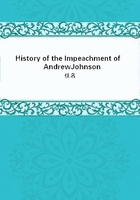
第92章 THE CONSTITUTIONAL POWER OF IMPEACHMENT.(4)
That would, in time, by equally logical sequence, have been the natural, inevitable result--and the end. The wreckage of the Great Republic of the age would have been strown upon the sands of the political seashore--relics of the disregard of the checks and balances established by the wisdom of its framers, in the fundamental law--and all for the satisfaction of personal ambitions and the hates of factional animosities.
History affords too many illustrations of that tendency to decadence and disruption from disregard of the proper and necessary checks and balances in the distribution and equalization of the powers of government, to permit us to doubt what the final end would have been had the President been removed on the unsubstantiated accusation preferred by the House of Representatives, Our peculiar system of political government--a Democratic Republic--passed the danger point of its history in that hour.
It was indeed a narrow escape. The history of civilization records no precisely similar condition. The country then passed the most threatening period of its history--but passed it safely.
The result was the highest possible testimonial to the strength and endurance of properly adjusted Democratic institutions that history records.
It emphasized not only the capacity of the American people for intelligent and orderly self-government, but also the strength and endurance of our popular forms. It was a profound surprise to those habituated to different political conditions. They had witnessed with astonishment the quiet disbandment of millions of men but as yesterday engaged in mortal strife--the vast armies as peacefully returning to former vocations as though from a great parade--and now, from a state of civil convulsion that in many another nation would have produced armed collision and public disorder, they saw an entire people quietly accepting the verdict of the highest authoritive body of the land, and practically dismissing the subject from thought. It was a splendid world-wide tribute to the strength and endurance of our system of popular government.
Yet the conclusion must not be deduced that the power of impeachment is not a wise provision of our Constitution, nor in any sense inconsistent with our popular forms. Conditions may, and are not unlikely to arise, some day, when the exercise of the power to impeach and remove the President may be quite as essential to the preservation of our political system as it threatened to become in this instance destructive of that system.
Should that day ever come, it is to be hoped that the remedy of impeachment, as established by the Constitution, may be as patriotically, as fearlessly, and as unselfishly applied as it was on this occasion rejected.
SUPPLEMENT.
Copy of letter addressed to each of the members of the Cabinet present at the conversation between the President and General Grant on the 14th of January, 1868, and the answers thereto:
Executive Mansion, Washington, D. C., February 5, 1868.
Sir:--The Chronicle of this morning contains a correspondence between the President and General Grant, reported from the War Department, in answer to a resolution of the House of Representatives. I beg to call your attention to that correspondence, and especially to that part of it which refers to the conversation between the President and General Grant, at the Cabinet meeting on Tuesday, the 14th of January, and to request you to state what was said in that conversation.
Very respectfully yours, Andrew Johnson.
Washington, D. C., February 5, 1868.
Sir:---Your note of this date was handed to me this evening. My recollection of the conversation at the Cabinet meeting on Tuesday, the 14th of January, corresponds with your statement of it in the letter of the 31st ultimo, in the published correspondence. The three points specified in that letter, giving your recollection of the conversation, are correctly stated.
Very respectfully, Gideon Welles.
To the President.
Treasury Department, February 6, 1868.
Sir:--I have received your note of the 5th instant, calling my attention to the correspondence between youself and General Grant, as published in the Chronicle of yesterday, especially to that part of it which relates to what occurred at the Cabinet meeting on Tuesday the 14th ultimo, and requesting me to state what was said in the conversation referred to.
I cannot undertake to state the precise language used, but I have no hesitation in saying that your account of that conversation.
as given in your letter to General Grant under date of the 31st ultimo. substantially and in all important particulars accords with my recollection of it.
With great respect, your obedient servant.
Hugh McCulloch.
To the President.
Post Office Department Washington, February 6, 1868.